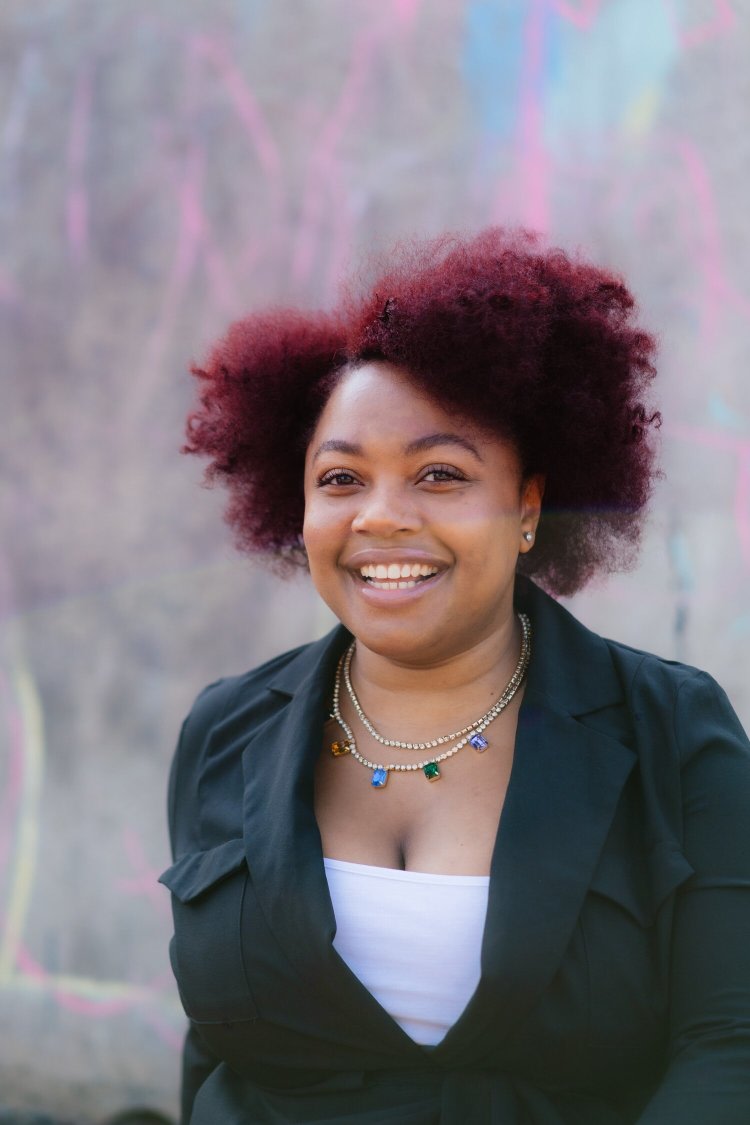As part of our Black History Month celebrations this year, we've invited Jaz Broughton to come and give a talk internally on the topic of performative allyship in the workplace. She's joining our weekly All Hands meeting later today, so the whole company will be tuning in to hear her thoughts.

Ahead of her talk, we took the opportunity to have a chat with her about the topic, and what Black History Month means to her...
We started by discussing a talk from activist Dr Shola Mos-Shogbamimu, who spoke at TEDx Leicester Women earlier this month. Dr Shola mentions the microaggressions Black women are subjected to regarding our hair in the workplace. We've shared our views with the community at Monzo about our pride in our hair and found that these microaggressions stem from curiosity and lack of understanding.
Q: Can you share a few ways which curious people can approach conversations about black hair that are welcomed?
A: "I speak as a woman who has had natural hair throughout her tech career (often dyed red, blue or green). It's a form of expression for me so I've always welcomed the curiosity of "how did you do it?" or "how long did it take?", the questions that I would ask my white colleague if she had changed her hair. The cardinal rule is just not to touch.
I remember when a white colleague began to say how soft my hair looked and reach out to touch it; at that exact point one of the office poodles began to bark at her and her owner (our CTO) laughingly said "yeah, that's why you shouldn't touch" so the message was received! It goes to show allyship can happen in many forms!"
We also discussed how Black people communicate and are perceived. The stereotype of Black women being aggressive, rude or ignorant. Really, this is just our passion and our drive, we speak with our entire bodies, with our hands. Unconscious bias training is something we have committed to at Monzo and will continue to offer to all employees.
Q: What are the steps beyond unconscious bias training that show noticeable changes within the workplace community at all levels?
A: "The training is the beginning, it's then about how the learnings are applied. Are the types of bias openly discussed in the recruitment process, are people using the learnings as a lens similar to the company values? Are processes that are now known as biased being removed from the workplace in favour of those that promote and foster inclusion?
These are examples of change that can take place as the organisation becomes more conscious at the individual and organisational level. The long-term change these should all lead to are a workplace where everyone feels included and equipped to perform regardless of race, gender, sexuality, faith or background. Where every group believes they can bring their full identity to the workplace and belong".
We've chosen to highlight some Black trailblazers in Finance on our blog this month, as their stories aren't often celebrated.
Q: Is there anyone you feel isn't celebrated or spoken about enough in our history?
A: "This isn't necessarily a Black person in finance but I was amazed to discover the story of Dido Elizabeth Belle; born into slavery but inherited great wealth she was independent as you could be as a woman in the 1700s. Her great uncle presided over a landmark case which argued whether slaves should be seen as property in the eyes of the law.
In Amma Asante's film depiction of Dido's story, she had a gentle influence over her great uncle in the result of the case but I mention her here as an early feminist enabled by her financial means. Something that is still important for women today, especially Black women, money was a tool for her to live the life she wanted and to rise above some (not all) oppressions of her time".
Q: What does Black History Month mean to you?
A: "Black History Month is a time to celebrate and re-educate ourselves on what it means to be Black. Each year I learn new stories, I open myself up to insight on different cultures across the diaspora and I celebrate openly to continue to let people know I'm always open to discuss my identity as a Black British woman. In each of the stories we read online or within documentaries we can see reflections of one another and especially as recognition is given to Black people in the present it is a time to remember our present is the history tomorrow's Black children will learn.
As I type, three Black British people in tech and entrepreneurship have been awarded MBE's; history in the making and it's a joy to see and spotlight. This kind of representation must be celebrated because for many of us, we know we have been deserving of this recognition all along but we knew it would take time to shine in a world, economy and society that wasn't designed for us".